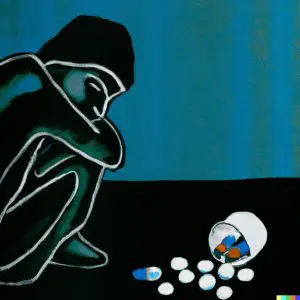
Depression Treatment
Lakewood & Longmont CO
Our team of licensed professionals specialize in Depression Treatment and we’d like to help you with a free consultation to understand your goals and match you with an appropriate team member.
Depression Symptoms
Depression manifests in ways that are often hard to notice. In addition to profound feelings of sadness and emptiness, you may be feeling unusually angry and irritable—every little thing seems to get under your skin or make you snap. Maybe you’ve experienced changes in your appetite or sleep habits. Perhaps you’ve withdrawn from your social life and find yourself saying no to outings with friends and family. Postpartum depression is coming after childbirth.
Depression Can Stem From Trauma, Grief, And Other Issues
In the end, one of the hardest parts of dealing with depression is trying to untangle it and understand where it came from. There may be unresolved trauma or unprocessed grief and loss in your life. Without your conscious awareness, these issues could be impacting your mental health today, causing low self-esteem or feelings of hopelessness.
What’s more, perhaps you have a child or a teenager with depression. Maybe they show signs of depression but they’re resistant to tell you about their struggles. They may stay secluded in their room, fall behind in school, or even self-harm.
Whether you or a loved one is suffering from depression, we encourage you to connect with us. Here at Self-Care Impact, we want to help you learn how to treat depression so that you can experience peace of mind and enjoy your life again.
Cultural Barriers Pressure Many People To Stay Silent About Depression
Almost everyone experiences depression at some point in life, if only for short periods of time. However, for many people, the symptoms of depression are more severe and affect almost every moment of their lives. This is a sign of clinical depression and means that they should seek professional help.
Unfortunately, many people resist telling others about their struggles because of cultural barriers. There is still a stigma surrounding depression—people who suffer from it worry that others will consider them “weak” or “soft.” Men, especially, are often encouraged to hide their emotions. They are more likely to struggle with depression than women, but are less likely to report it.
It’s Difficult To Untangle The Roots Of Your Depression
You may tell yourself that you can manage your depression alone, but this is easier said than done. No matter how emotionally intelligent you are, you still have to reckon with the limits of your own perspective. Moreover, it’s hard to determine exactly where your depression came from. It may be situational, related to genetics, or even the result of trauma or grief and loss.
In treatment, you get the benefit of a counselor who can help you freshen your perspective and explore the origins of your depression. Between your commitment and our support, we are confident that we can help you get to the bottom of your symptoms and renew your sense of joy.
Depression Treatment Can Help You Increase Your Awareness And Uncover Your Needs
Self-awareness is the key to all healing. After all, it is only by identifying your needs that you can learn how to meet them. Here at Self-Care Impact, we want to help you uncover your deepest needs and understand how depression prevents them from being fulfilled. Our goal is to help you explore the roots of your depression, change your thinking habits, and enhance your self-compassion.
What To Expect In Sessions
The first thing we want to do is understand where your depression stems from. Perhaps there is unresolved trauma, abuse, or grief from your past. These experiences may have caused you to feel hopeless about the future and unable to find solace in relationships. Or maybe your life lacks healthy social support and your loved ones can’t give you the care you need. Pinpointing the source of your symptoms will help us understand what needs haven’t been met and map out a path forward.
From there, we will focus on goals to work on together. Since depression often goes hand in hand with low self-esteem, we may work on enhancing your self-compassion. After all, depression is not your fault—the root causes of your symptoms are outside of your control, so it’s important to be kind to yourself.
Additionally, we want to help you expand your awareness of your thoughts and understand how they impact your feelings and behavior. By modifying negative thought patterns and replacing them with positive ones, you can change the way you feel and the way you act.
Tailoring Your Depression Treatment Plan
One of the primary approaches our practice draws from is called Internal Family Systems (IFS). The idea behind IFS is that the self is made up of many individual parts, some of which may be adaptive and some of which may be harmful. IFS can help you identify patterns in your life that may have been adaptive at one point but no longer benefit you today.
For instance, maybe you grew up in a chaotic environment where you had to fend for yourself most of the time. As a result, you may have developed a part of yourself that is highly independent and separate from others. Over time, too much self-reliance can cause you to feel lonely and isolated, which in turn can lead to depression. The goal of IFS is to identify the parts of you that are fueling your depression and keep them from controlling your life.
No matter how hopeless you feel, depression is highly treatable and there are infinite avenues for healing and relief. By helping you modify negative thoughts and behaviors, we are confident that we can make a difference in your life.
You May Have Some Questions About Depression Therapy…
If I dwell about my uncomfortable feelings, won’t I just feel worse?
Our emotions are a call to action. When we ignore them and try to push them away, they only become more powerful because they remain untreated. To truly release our emotional pain, we have to confront it. Here at Self-Care Impact, we will help you address your negative emotions in a way that is safe, controlled, and does not stress you out.
I’m having suicidal thoughts. How concerned should I be?
Believe it or not, virtually everyone will think about suicide at some point in life. The important thing to know is that there is a spectrum of suicidal thoughts—maybe you experience thoughts about hurting yourself with no desire to act on them, or maybe you’re not sure that you want to act on them. In therapy together, we will assess your risk factor so that we can come up with a plan for healing and recovery.
I’ve already tried everything—why should I try depression counseling?
We draw from a wide range of trusted, evidence-based approaches to help clients learn how to deal with depression. Just because one approach didn’t work for you, doesn’t mean there aren’t any that will. We’ve been able to help numerous people find relief from their symptoms. We believe that we can do the same for you.
We offer Depression Therapy in Lakewood & Longmont CO
If you (or your child or teenager) struggle with depression, we encourage you to take heart. Depression does not have to be permanent, and it doesn’t have to keep you from fulfilling your dreams. To begin the healing process with us, you can use the contact form to email us or call 720-551-4553 for a free, 15-minute phone consultation.
Helpful Reading

Overcoming Dysthymia: Low-Grade Depression
What is Dysthymia? Dysthymia, also known as persistent depressive disorder, is a long-lasting, mild or low-grade depression that comes and goes over time. It can

What’s Your Attachment Style?
Have you ever asked yourself why you keep doing a certain thing even though it keeps hurting you? The answer is quite simple. It keeps

Finding Purpose in Life: A Journey of Self-Discovery and Community Engagement
What does it truly mean to find purpose in life? How do we forge a path that not only fulfills us but also contributes to

Unlocking the Power of Mental Health
Understanding and prioritizing mental wellness is crucial for leading a fulfilling life. While the importance of physical health is widely acknowledged, mental health often remains

6 Ideas for Overcoming Depression Without Medication
With more than 21 million adults in the United States experiencing major depression, it needs to be something that we talk about without fear of
